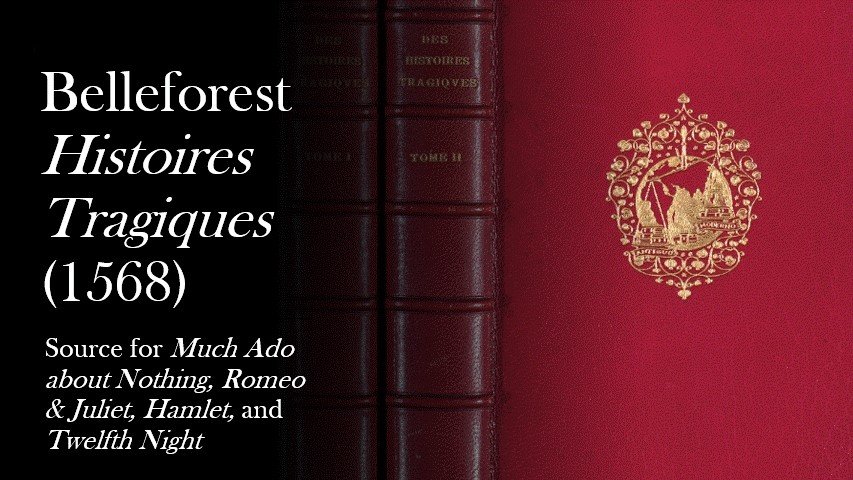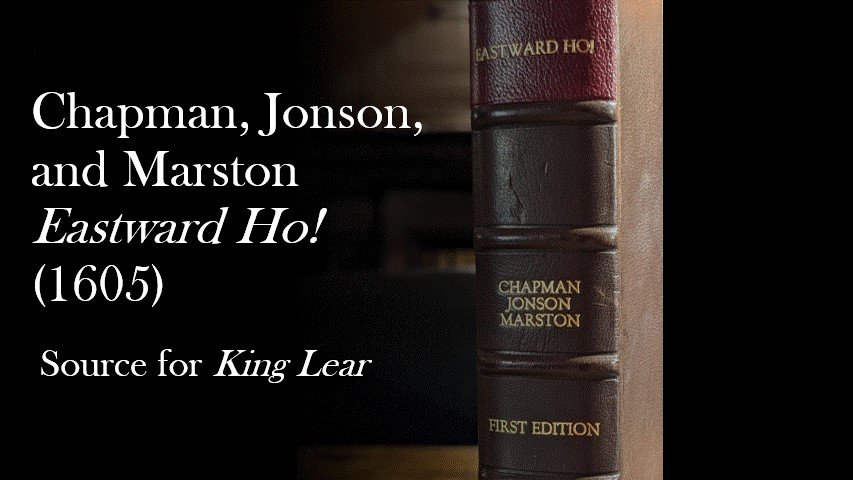Chapman, Jonson, and Marston's Eastward Ho! (1605)
CHAPMAN, George (1559-1634), JONSON, Benjamin (1572-1637) and MARSTON, John (1576-1634)
Eastward Hoe. As it was played in the Blackfriars by the Children of her Majesties Revels. London: William Aspley, 1605.
Echoes of Eastward Ho! in King Lear have led some scholars to conclude that Shakespeare's play could not have been composed before 1605. (See Gary Taylor, “A New Source and an Old Date for King Lear,” Review of English Studies 33 [1982]: 396-413.)
Eastward Ho! caused a sensational scandal in 1605. The newly-crowned King James took offense at the playwrights’ jokes about Scotland and Scottish accents, and George Chapman and Ben Jonson were imprisoned (all the while blaming the offensive passages on John Marson). Jonson recounted that they were told they were to have their “ears cut and noses” as punishment, but the threat was not carried out. In some copies of the first edition of the quarto playbook, such as the present one, passages on signatures E3-E4 were censored to remove anti-Scottish sentiment and replaced by a half-sheet.
The most offensive sections seem to have been jibes about the unification of England and Scotland and social-climbing Scots, such as those in the Act 3, Scene 3 description of Virginia, which is deemed mostly pleasant:
You shall live freely there, without sergeants, or courtiers, or lawyers, or intelligencers; only a few industrious Scots, perhaps, who, indeed, dispersed over the face of the whole earth. But as for them, there are no greater friends to Englishman and England, when they are out on’t, in the world, than they are. And for my part, I would a hundred thousand of ‘hem were there; for we are all one countrymen now, ye know; and we should find ten times more comfort of them there than we do here.
And a few lines later, “you may be an alderman there, and never be a scavenger; you may be a nobleman, and never be a slave.”
FIRST EDITION: Quarto. A-I4; 36 leaves. A corrected copy (Qc). Pages trimmed close and tipped to larger sheets. Title-page includes a double-volute woodcut ornament and the signature “W. E. Burton” as well as notes by an unknown hand reading “Editio Princeps” and “1757”. Sig. C2 and G2 trimmed at foot with loss of a single line on each page, replaced in early manuscript (see photos).
William Evans Burton (1804-1860), the son of a London printer, tried and failed to run his father’s printing firm after his father’s death. He gradually drifted into a career as an actor, playing with various regional companies before premiering at the Haymarket Theatre in London in 1832. Several years later, he moved to the United States and became a successful actor-manager, operating in New York City, Philadelphia, and Baltimore. He also established the Gentlemen’s Magazine, in the pages of which its editor Edgar Allan Poe anonymously accused Henry Wadsworth Longfellow of plagiarism, igniting the “Longfellow War.”
Burton’s successes as an actor, manager, writer, and publisher allowed to him accumulate a library of over 100,000 volumes, including numerous early modern printings of English plays, the most recognizable of which were copies of Shakespeare’s First, Second, Third, and Fourth Folios. The library was auctioned off after his death in 1860. This copy of Eastward Ho! was included in that sale, although the auction catalogue incorrectly identified the quarto as being in the uncorrected state.
Binding: 19th-century brown morocco over marbled boards. Custom quarter-calf clamshell case, slightly rubbed.
Provenance: W.E. Burton; Paul Peralta-Ramos.
References: STC 4973; Greg I 217(c); Pforzheimer 149.
CHAPMAN, George (1559-1634), JONSON, Benjamin (1572-1637) and MARSTON, John (1576-1634)
Eastward Hoe. As it was played in the Blackfriars by the Children of her Majesties Revels. London: William Aspley, 1605.
Echoes of Eastward Ho! in King Lear have led some scholars to conclude that Shakespeare's play could not have been composed before 1605. (See Gary Taylor, “A New Source and an Old Date for King Lear,” Review of English Studies 33 [1982]: 396-413.)
Eastward Ho! caused a sensational scandal in 1605. The newly-crowned King James took offense at the playwrights’ jokes about Scotland and Scottish accents, and George Chapman and Ben Jonson were imprisoned (all the while blaming the offensive passages on John Marson). Jonson recounted that they were told they were to have their “ears cut and noses” as punishment, but the threat was not carried out. In some copies of the first edition of the quarto playbook, such as the present one, passages on signatures E3-E4 were censored to remove anti-Scottish sentiment and replaced by a half-sheet.
The most offensive sections seem to have been jibes about the unification of England and Scotland and social-climbing Scots, such as those in the Act 3, Scene 3 description of Virginia, which is deemed mostly pleasant:
You shall live freely there, without sergeants, or courtiers, or lawyers, or intelligencers; only a few industrious Scots, perhaps, who, indeed, dispersed over the face of the whole earth. But as for them, there are no greater friends to Englishman and England, when they are out on’t, in the world, than they are. And for my part, I would a hundred thousand of ‘hem were there; for we are all one countrymen now, ye know; and we should find ten times more comfort of them there than we do here.
And a few lines later, “you may be an alderman there, and never be a scavenger; you may be a nobleman, and never be a slave.”
FIRST EDITION: Quarto. A-I4; 36 leaves. A corrected copy (Qc). Pages trimmed close and tipped to larger sheets. Title-page includes a double-volute woodcut ornament and the signature “W. E. Burton” as well as notes by an unknown hand reading “Editio Princeps” and “1757”. Sig. C2 and G2 trimmed at foot with loss of a single line on each page, replaced in early manuscript (see photos).
William Evans Burton (1804-1860), the son of a London printer, tried and failed to run his father’s printing firm after his father’s death. He gradually drifted into a career as an actor, playing with various regional companies before premiering at the Haymarket Theatre in London in 1832. Several years later, he moved to the United States and became a successful actor-manager, operating in New York City, Philadelphia, and Baltimore. He also established the Gentlemen’s Magazine, in the pages of which its editor Edgar Allan Poe anonymously accused Henry Wadsworth Longfellow of plagiarism, igniting the “Longfellow War.”
Burton’s successes as an actor, manager, writer, and publisher allowed to him accumulate a library of over 100,000 volumes, including numerous early modern printings of English plays, the most recognizable of which were copies of Shakespeare’s First, Second, Third, and Fourth Folios. The library was auctioned off after his death in 1860. This copy of Eastward Ho! was included in that sale, although the auction catalogue incorrectly identified the quarto as being in the uncorrected state.
Binding: 19th-century brown morocco over marbled boards. Custom quarter-calf clamshell case, slightly rubbed.
Provenance: W.E. Burton; Paul Peralta-Ramos.
References: STC 4973; Greg I 217(c); Pforzheimer 149.

CHAPMAN, George (1559-1634), JONSON, Benjamin (1572-1637) and MARSTON, John (1576-1634)
Eastward Hoe. As it was played in the Blackfriars by the Children of her Majesties Revels. London: William Aspley, 1605.
Echoes of Eastward Ho! in King Lear have led some scholars to conclude that Shakespeare's play could not have been composed before 1605. (See Gary Taylor, “A New Source and an Old Date for King Lear,” Review of English Studies 33 [1982]: 396-413.)
Eastward Ho! caused a sensational scandal in 1605. The newly-crowned King James took offense at the playwrights’ jokes about Scotland and Scottish accents, and George Chapman and Ben Jonson were imprisoned (all the while blaming the offensive passages on John Marson). Jonson recounted that they were told they were to have their “ears cut and noses” as punishment, but the threat was not carried out. In some copies of the first edition of the quarto playbook, such as the present one, passages on signatures E3-E4 were censored to remove anti-Scottish sentiment and replaced by a half-sheet.
The most offensive sections seem to have been jibes about the unification of England and Scotland and social-climbing Scots, such as those in the Act 3, Scene 3 description of Virginia, which is deemed mostly pleasant:
You shall live freely there, without sergeants, or courtiers, or lawyers, or intelligencers; only a few industrious Scots, perhaps, who, indeed, dispersed over the face of the whole earth. But as for them, there are no greater friends to Englishman and England, when they are out on’t, in the world, than they are. And for my part, I would a hundred thousand of ‘hem were there; for we are all one countrymen now, ye know; and we should find ten times more comfort of them there than we do here.
And a few lines later, “you may be an alderman there, and never be a scavenger; you may be a nobleman, and never be a slave.”
FIRST EDITION: Quarto. A-I4; 36 leaves. A corrected copy (Qc). Pages trimmed close and tipped to larger sheets. Title-page includes a double-volute woodcut ornament and the signature “W. E. Burton” as well as notes by an unknown hand reading “Editio Princeps” and “1757”. Sig. C2 and G2 trimmed at foot with loss of a single line on each page, replaced in early manuscript (see photos).
William Evans Burton (1804-1860), the son of a London printer, tried and failed to run his father’s printing firm after his father’s death. He gradually drifted into a career as an actor, playing with various regional companies before premiering at the Haymarket Theatre in London in 1832. Several years later, he moved to the United States and became a successful actor-manager, operating in New York City, Philadelphia, and Baltimore. He also established the Gentlemen’s Magazine, in the pages of which its editor Edgar Allan Poe anonymously accused Henry Wadsworth Longfellow of plagiarism, igniting the “Longfellow War.”
Burton’s successes as an actor, manager, writer, and publisher allowed to him accumulate a library of over 100,000 volumes, including numerous early modern printings of English plays, the most recognizable of which were copies of Shakespeare’s First, Second, Third, and Fourth Folios. The library was auctioned off after his death in 1860. This copy of Eastward Ho! was included in that sale, although the auction catalogue incorrectly identified the quarto as being in the uncorrected state.
Binding: 19th-century brown morocco over marbled boards. Custom quarter-calf clamshell case, slightly rubbed.
Provenance: W.E. Burton; Paul Peralta-Ramos.
References: STC 4973; Greg I 217(c); Pforzheimer 149.







